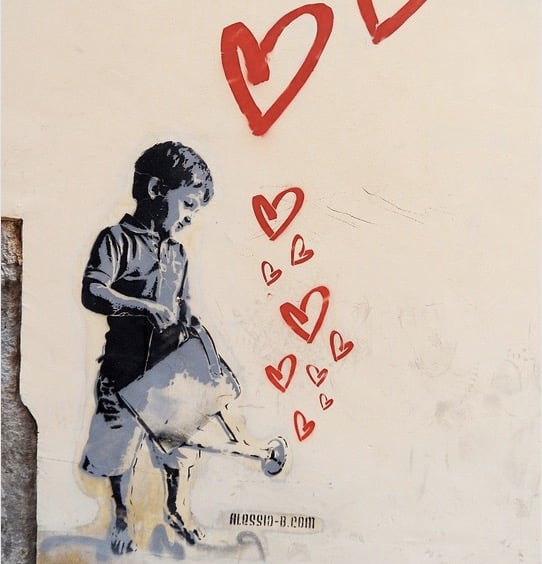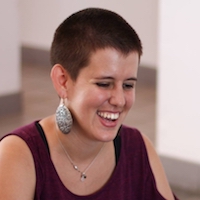For the last 10 years, I have been a bleeding heart martyr.
I felt if I was not helping others, something was fundamentally wrong with my being. So I helped people like it was a full-time job. I sat with them, listened to their problems, let them cry on me, cried with them, tried to give them hope for the future, and cleaned their houses.
These people were dear friends to me. At one point, my husband and I sold everything, lived in a travel trailer, and moved to a small rural town to be of more help for the group we belonged to. Whatever the people I met needed, I worked hard to provide. I do not regret helping any one of those people one bit. Some of my best lessons in gratitude and love have come from these people. Simultaneously though, never replenishing myself made me into an exhausted shell.
I have played with various concepts of self-care for about a year on and off, but mostly off. Over the past several months, I have committed and practiced a significant amount of self-care and self-compassion, even though a voice inside of me whispers resistance every day. “You can’t change how you feel,” or “Who are you to think you deserve this?” You know what? I’m still trying to trust this process and move forward.
Here’s why:
Self-care and compassion have become a place of constancy in my ever-changing life: the anchor that keeps me from running. The stability that we’ve created, makes both my husband and I feel like we are back with the people we were when we met. Holding space for myself allows me to more naturally hold space for him.
I still help others and we run our business together, but we are mandating rest in this house. When you greet yourself with compassion, it’s easier to do it for the other person. Have a long day? Stay home and take a bath. Having trouble meditating? Let’s do it together. Need to get grounded? Let’s garden.
With this approach, each of us is relaxing. I heard stories of change like this all the time from people who started meditating or considering concepts of self-love, compassion, and non-judgment, but I thought it was utter bullsh*t—something that worked for other people, but not for me. Looking back now, I can pinpoint what made a skeptic out of me and might be working against you too.
First of all, pride.
Nobody reacts well to even the most constructive criticism at times; I know I don’t. If someone offers us advice, whether we ask for it or not, that could mean they see us, and that can be terrifying. Our imperfect self is showing, and man, does it feel more flawed when it is being observed? Even when people try to check us on something that we are aware of, it’s easy to say “Nope, I’m okay.” Somehow, when that feeling is in the way, it’s like we stop acknowledging that our needs cannot be met without communication, or effort, and the sometimes dreaded help.
Second, negative comparisons left me with no doubt that all of this self-care nonsense was pretty selfish.
We have all been there. It always feels like someone else has their crap more together than us. For me, it was knowing my heritage. I came from people who pushed their lives across the country on carts and survived. My great-grandmother was a tough, single farming lady who took care of business.
This caused me to adopt a subtle motto: whenever life puts you in a desperate situation, just do it. But that isn’t me either. In the era of the social media portrait of our lives, there’s always a million ways to see things that skew toward someone having it all figured out. “Look how much more they are accomplishing at their business.” Or “Look at their marriage, they look so close.”
The truth is, we are not those other people. We are not in their circumstances. Not many people take a selfie with #fallingapartinthebathroom tagged on it. And even family history is often viewed through a heroic lens.
Things started changing for me in radical ways when I started caring for myself. When I made that a priority, I created a foundation from which to do everything else. It was like I could breathe again in a way I never knew I was suffocating.
If we fall and scrape our knee, the automatic response is compassion for ourselves. We notice our pain, tend to our wound, and we find a band-aid. Problem solved. Most likely there will be no lasting harm or infection. The trick is learning to implement this emotionally as well. And guess what? It turns out it isn’t that hard, we don’t have to be perfect to do it, and it freaking feels good.
Here’s what has helped me—with some science backup for anyone still skeptical:
1. Meditation
This is one of the first aspects I adopted about two years ago, and just the tiny space between thought and action has made a world of difference.
Here is an article with 20 actual study-backed reasons to start your practice, including this:
“It gives you perspective: By observing your mind, you realize you don’t have to be slave to it. You realize it throws tantrums, gets grumpy, jealous, happy and sad but that it doesn’t have to run you. Meditation is quite simply mental hygiene: clear out the junk, tune your talents, and get in touch with yourself…”
What would the world be like for all of us, if instead of forever reacting to everyone and everything, we had just a little bit more perspective? If everyone could have calmer families, what would the ripple effect of that be for our creativity and well-being as the human race?
2. Positive self-talk and self-compassion
The most significant struggles and results come together here. Very early on, messages from everywhere tell us that we are not enough. We need to work harder, play smarter, be more of this, but less of that.
All of this bombardment leads to negative comparisons of ourselves to others and just a general feeling of disempowerment. Changing our narratives over time can be intensely powerful and intensely liberating. If we don’t need to be more or less of anything, we can take some performance pressure off. If we were to stand outside of ourselves and imagine what advice we might give a friend, would it be: “Tough it out,” “Keep a stiff upper lip,” or “You should be ashamed you are struggling”? Nope, I know I’d be like: “Here’s a hug, let us have some brunch and cry this mother out. Remember to breathe, and you are going to get through this because you are strong as hell.”
Here is everything you could ever want to know about self-compassion, along with PDFs of all the scientific studies on it.
“If we use self-compassion practice to try to make our pain go away by suppressing it or fighting against it, things will likely just get worse. With self-compassion we mindfully accept that the moment is painful, and embrace ourselves with kindness and care in response, remembering that imperfection is part of the shared human experience. This perspective allows us to hold ourselves in love and connection, giving ourselves the support and comfort needed to bear the pain, while providing the optimal conditions for growth and transformation.”
3. Closely related to this, is the last one. Giving and receiving help.
Yep, giving is not bad when it’s balanced with receiving. It benefits our well-being, but then most of us know that right? That’s why we give to others in excess without refueling: because it still feels good. If we can receive help and fill ourselves back up, how would that feel?
Could we get rid of even a fraction of the struggle mentioned here?
“Even if support is offered, it may feel awkward, uncomfortable, or even painful to be under the spotlight of compassion. Receiving compassionate support may challenge a person’s sense of alignment with social or cultural norms around keeping a stoic grip on one’s emotions, or being seen as individually self-sufficient, “together,” or “low-maintenance.” Receiving compassion inherently involves an acknowledgment of personal vulnerability, which may make it harder to “hold it together” or (if things get emotional) add shame to the equation. Some may also avoid feeling like a burden, obliging others to waste their precious time and energy.”
So, even if embracing this is still iffy, that’s okay. The beauty of our humanity isn’t perfection; it’s just being exactly where we are. If you are like me and deal with a dark voice in the back of your head that tells you self-care is bullsh*t, you don’t have to kill it right away.
Maybe if we all sit down with it and continually offer it some science, some compassion, and a cup of tea, we could end up on a whole new beautiful path through life.
~
Author: Kayleigh Starr
Image: Max Pixel
Editor: Kenni Linden
Copy Editor: Sara Kärpänen








Read 1 comment and reply